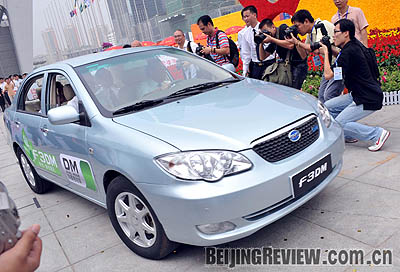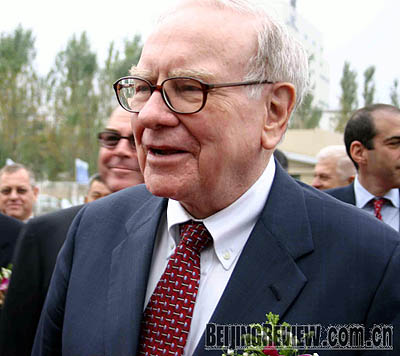|

A GAME CHANGER: Hybrid and all-electric vehicles are regarded as "game changer" for the automobile industry. BYD will sell its first plug-in hybrid, F3DM, by the end of this year in China
American investor and businessman Warren E. Buffett has found a "really long hill" in China to snowball his wealth. The "Oracle of Omaha" is known for his investment wisdom as well as his famous likening of finding investments to a snowball. "The important thing is to find wet snow and a really long hill," he has said.
BYD Co. Ltd. is Buffett's long hill in China and his first investment in a company here. MidAmerican Energy Holdings Co., a subsidiary of Berkshire Hathaway Inc., Buffett's conglomerate holding company headquartered in Omaha, Nebraska, announced on September 27 that it paid $230 million for a nearly 10-percent stake in the Shenzhen-based battery producer and automaker.
Established in 1995 and listed on the Hong Kong Stock Exchange in 2002, the BYD has seven production facilities located in different regions around China.
"We are very impressed by BYD's outstanding management team and its research and development capability, especially the capability of translating technologies to products," said David Sokol, Chairman of MidAmerican, at a press conference.
Buffett did not attend the news conference, but said in a statement that he was impressed with the management record of BYD's President Wang Chuanfu.
The investment sage is worshipped for his powerful, long-term investment strategy. He has traditionally shied away from technology-oriented companies and favored simple and mature businesses he understands. Some of his most famous investments include American beverage company Coca-Cola Co. and razor maker The Gillette Co., now owned by Proctor & Gamble Co.
But why would Buffett invest such a large amount in BYD, a company focused on hi-tech batteries and electric cars, as his first strategic investment in a Chinese firm?
Value investing
Buffett is a high-profile proponent of "value investing," or the strategy of selecting stocks that trade for less than their intrinsic value. The intrinsic value of a security refers to the present value of all expected future income generated by the asset.

INVESTMENT SAVVY: Warren Buffett picked BYD this time for his confidence in the company's battery-based earning power
Such securities may have high dividend yields, low price-to-earning (PE) ratios or low price-to-book (PB) ratios. A low PB ratio, which compares the market value of a company to the value of its total tangible assets minus liabilities, could indicate the stock is currently undervalued and may have potential for future growth.
Buffett is known for his ability to calculate the intrinsic value of a business and then buy that company at a discount to its intrinsic value. In the case of BYD, Buffett bought the company's stock at a price of HK$8 ($1) per share when the PE ratio was less than 8 and the PB ratio was only 2.5.
It appears to be a real bargain for Buffett. BYD's shares had lost 45 percent of their value when their price dived from HK$77 ($10) per share at its peak to the current HK$8 per share in the past year, partly because of legal disputes between BYD and rival Foxconn International Holdings Ltd. over alleged patent infringement.
| 